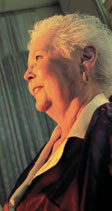 
Molecular
Medicine
(continued)
Not
all clinical trials look at new drugs. Many are designed instead
to evaluate new doses or combinations of existing agents, or to
assess an existing agent in an additional form of cancer.
Donna Jenson, 69, an artist living in Magalia, Calif., made her
way to UC Davis Cancer Center in March 2001 after she was diagnosed
with non-Hodgkin’s lymphoma. Here, she agreed to participate
in a clinical trial of rituximab, a drug that fits into receptors
on lymphoma cells and flags them for destruction by the immune system.
The drug earned FDA approval in 1997, but continues to be investigated
in dozens of clinical trials around the world. The ongoing trials
seek to determine the optimal dosing for the drug, and the most
powerful combinations of rituximab and other drugs against multiple
forms of cancer.
Jenson’s cancer rapidly retreated into remission on her experimental
rituximab regimen, and she is glad she opted to try a cutting-edge
treatment, one with the potential to be better than standard therapy.
“I am doing wonderful,” she said. “I feel better
than I have in years.”
Leasa Leonard, 62, was diagnosed with adenocarcinoma last January
and given six months to live. She knew there were no guarantees,
but she still decided to volunteer for a clinical trial of UCN01,
another investigational targeted therapy.
“I knew that even if the drug didn’t help me, by participating
I could do something for science,” she said. “After
all, someone else did the same for the drugs I was already taking.”
All signs so far are good. By enrolling in the UCN01 trial, Leonard
has benefited not just science, but herself.
Within five days of starting on UCN01, the tumors on her jaw and
collarbone disappeared. Her other tumors continue to shrink.
“Everything is smaller,” she said. “They were
growing pretty rapidly, and they just stopped.”
  

Home |
Table of Contents |
To our Readers |
Building on Basics
Focusing on Patients |
In Translation |
First Steps
Campus Connection |
Benefactors |
News in Brief
UC Davis Health System |
© 2000, 2001, 2002 UC Regents. All rights reserved.
|
 |



 

Leasa
Leonard
Diagnosis:
Adeno-carcinoma
Treatment:
UCN01
clinical trial
Status:
Dramatic
improvement
|


